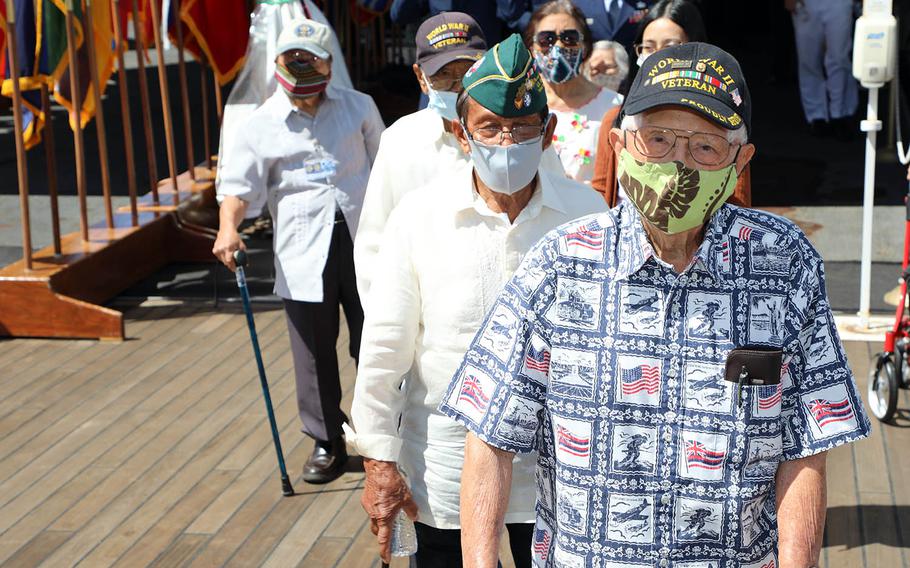
World War II veterans walk to the fantail of the battleship Missouri on Sept. 2, 2020, for a commemoration of the 75th anniversary of the end of the war. (David C. Livingston)
HONOLULU, Hawaii — Seventy-five years ago, 900 bombers and fighters filled the sky above Tokyo Bay, where 250 Allied ships were moored as Imperial Japan formally surrendered during a ceremony on the deck of the USS Missouri.
Thousands of servicemen crammed the decks and turrets of the battleship to view the historic signing on Sept. 2, 1945, bringing an end to World War II.
On Wednesday, only a dozen veterans of the war were on the fantail of that ship in Pearl Harbor, Hawaii, to witness a commemoration marking the 75th anniversary of the war’s end, their numbers thinned by time.
More than 100 veterans of the war had planned to attend – including 14 who were in Tokyo Bay 75 years ago – but event planners decided the risks posed by the virus were too great for veterans well into their 90s. The veterans who did attend live in Hawaii.
“It is fitting that we are gathered here today on USS Missouri, where the conflict in the Pacific came to an end on this day in 1945,” said U.S. Defense Secretary Mark Esper during the 90-minute commemoration aboard the ship, now a museum called the Battleship Missouri Memorial.
“It now rests in the very harbor where more than 2,400 Americans paid the ultimate price nearly eight decades ago, at the beginning of World War II,” Esper said.
The United States entered World War II after the Japanese surprise attack on Pearl Harbor and Oahu island on Dec. 7, 1941. The Missouri is now moored on what was on the day of the attack called Battleship Row, which was decimated by the attack.
“On this day, on this deck, 75 years ago, we marked the end in the Pacific theater of a great global war that touched every man, woman and child of my parents’ generation,” said Hawaii Gov. David Ige, whose father was a member of the famed 442nd Regimental Combat Team, which was composed primarily of soldiers of Japanese descent.
“It was won by an abiding belief in freedom and democracy and by the strength of character, courage and resilience that defied all odds,” Ige said.
Noting that the commemoration had been drastically scaled back for original plans due to the pandemic, Ige said that was perhaps “for the best.”
“In moments like these we tend to get caught up in the pomp and circumstance and sometimes forget the real reason why we gather: all of these veterans,” he said.
Wreaths presented by 14 nations – including Australia, Japan, South Korea, Russia and Germany – were placed on the ship during the ceremony in respect and tribute to the men and women who lost their lives during the war.
“Sept. 2 is the day the United States and our allies turned tragedy into triumph, violence into victory, fighting into freedom, loss into liberty and peril into peace,” said Adm. Phillip Davidson, commander of U.S. Indo-Pacific Command, during the ceremony.
It was a day that marked “the very beginning of rules-based international order, an order responsible for some 75 years of peace, prosperity and security that helped to liberate not only hundreds of millions but to lift billions out of poverty.”
Although the United States fought beside China against Japan in World War II, Davidson offered a harsh assessment of the former ally.
“[A]n emboldened Communist Party of China seeks to change the world to one in which Chinese national power is more important than international law,” Davidson said. “Beijing is using a whole-of-Party approach to coerce, to corrupt and to contest the rules-based international order. Today, as we address the strategic threat of China and the other security challenges throughout the Indo-Pacific region, the memory of our greatest generation lives on. It lives on in our soldiers, our sailors, our airmen, our Marines and our Coast Guardsmen today.”
Esper described the war as “an inflection point in the history of our great nation and for humanity writ large.”
“The global fight against tyranny and oppression cost more than 70 million lives and caused unimaginable loss for the United States and our allies,” he said. “Virtually no household was left untouched by the scale or scope of its wanton destruction.”
olson.wyatt@stripes.com Twitter: @WyattWOlson